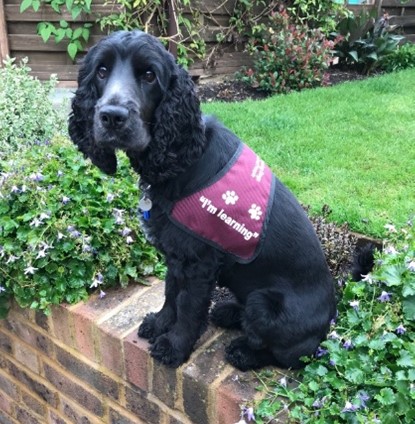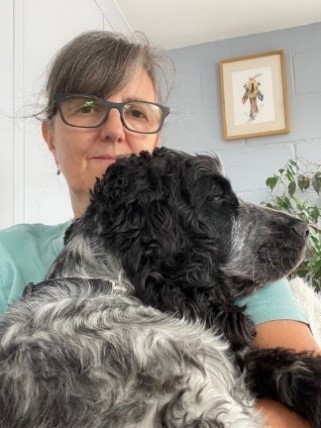Paws for a Cause: How One Blue Yonder Associate Shares Her Story of Volunteerism and Canine Companionship



September is National Guide Dog Month in the U.S., honoring the work of guide dogs and raising awareness, appreciation, and support for assistance dogs. These four-legged companions go through rigorous training to properly assist their humans and keep them safe. UK-based associate Heather Wildman shares her experience as a volunteer who trains assistance dogs.
When I met my husband, we both shared a love for animals, specifically dogs. I was the owner of a Dalmatian, and he had a Collie-Pointer cross. When we lost them both due to old age, we decided that while we could not bear the pain of loss again, we really missed having a dog in our lives. We knew that we wanted to make an impact on a furry canine companion. A chance visit to the Hearing Dogs for Deaf People found us signing up to become volunteers. This seemed like a great way to enjoy a four-legged companionship while helping others.
The Hearing Dogs for Deaf People is a UK charity organization founded in 1982 that trains dogs to be the ears for those with hearing difficulties. They provide amazing support to those who need a companion dog and are great to work with if you are a volunteer.
After basic training, one of the next things a Hearing Dog practices are “sound” training, which involves recognizing things like cooker timers, alarm clocks, and fire alarms so they can alert their human companion to possible danger/action. For example:
- When a dog hears the cooker timer/doorbell, they investigate and are instructed to come to find us, nudge us, and take us to the timer/door.
- When the fire alarm goes off, the dog is instructed to nudge us and then drop to the floor, which indicates that it is an emergency noise.
- When our alarm clock goes off in the morning, we are greeted by 4 paws and a sometimes even a lick to the face to ensure we are fully awake. This ensures we are up and alert, ready to start our day.
The training is accompanied by various corrective actions, praises, and, of course, lots of treats.
During the COVID-19 pandemic, we were asked to take a 15-month-old dog named Oreo. Seven months later, she moved on to complete her final stage of training and was placed in the care of a deaf person. Our next companion, Leighton, was so good with children that he completed his training with us and is now with an 11-year-old boy who is deaf. Leighton has bonded so well with the boy that he goes to bed at the same time as him and wakes him up in the morning by tapping the boy’s arm.
Currently, we have James, a dog who has struggled to get the nudge part of training. After much practice he has improved, resulting in a perfect nudge response to the cooker alarm. Naturally, he was rewarded with lots of cuddles, praise, and treats.
Volunteering has brought a different perspective to our lives. The experience has opened our eyes to the various relationships and bonds you can form with animals. We can still show love and care for each new furry friend while also training them to be the best companions for those who need physical and emotional support. Although it is sad to say goodbye to each dog, we are encouraged by their impact and know that they are ready and able to do such an important job while creating new memories with their future owners.
From my own experiences, I can say that volunteering for your local shelter or animal charity will have you reaping the rewards of new knowledge and a newfound admiration for service animals.

